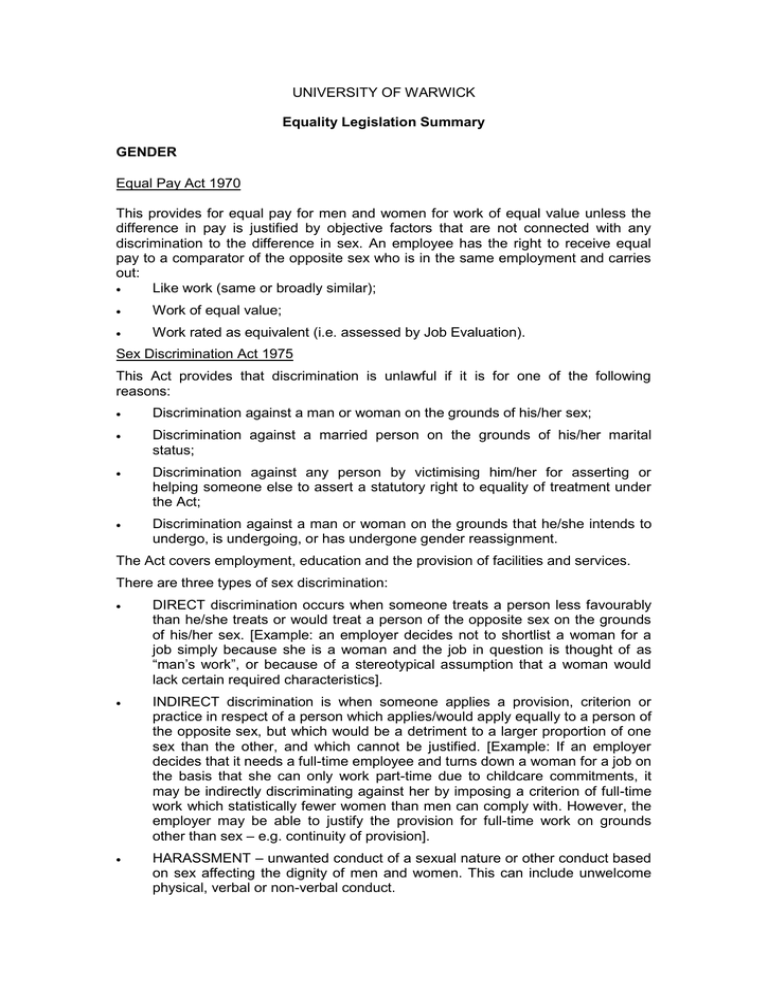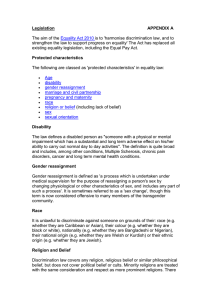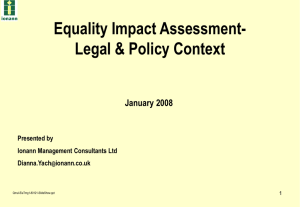
UNIVERSITY OF WARWICK
Equality Legislation Summary
GENDER
Equal Pay Act 1970
This provides for equal pay for men and women for work of equal value unless the
difference in pay is justified by objective factors that are not connected with any
discrimination to the difference in sex. An employee has the right to receive equal
pay to a comparator of the opposite sex who is in the same employment and carries
out:
Like work (same or broadly similar);
Work of equal value;
Work rated as equivalent (i.e. assessed by Job Evaluation).
Sex Discrimination Act 1975
This Act provides that discrimination is unlawful if it is for one of the following
reasons:
Discrimination against a man or woman on the grounds of his/her sex;
Discrimination against a married person on the grounds of his/her marital
status;
Discrimination against any person by victimising him/her for asserting or
helping someone else to assert a statutory right to equality of treatment under
the Act;
Discrimination against a man or woman on the grounds that he/she intends to
undergo, is undergoing, or has undergone gender reassignment.
The Act covers employment, education and the provision of facilities and services.
There are three types of sex discrimination:
DIRECT discrimination occurs when someone treats a person less favourably
than he/she treats or would treat a person of the opposite sex on the grounds
of his/her sex. [Example: an employer decides not to shortlist a woman for a
job simply because she is a woman and the job in question is thought of as
“man’s work”, or because of a stereotypical assumption that a woman would
lack certain required characteristics].
INDIRECT discrimination is when someone applies a provision, criterion or
practice in respect of a person which applies/would apply equally to a person of
the opposite sex, but which would be a detriment to a larger proportion of one
sex than the other, and which cannot be justified. [Example: If an employer
decides that it needs a full-time employee and turns down a woman for a job on
the basis that she can only work part-time due to childcare commitments, it
may be indirectly discriminating against her by imposing a criterion of full-time
work which statistically fewer women than men can comply with. However, the
employer may be able to justify the provision for full-time work on grounds
other than sex – e.g. continuity of provision].
HARASSMENT – unwanted conduct of a sexual nature or other conduct based
on sex affecting the dignity of men and women. This can include unwelcome
physical, verbal or non-verbal conduct.
In addition, VICTIMISATION occurs if an individual is treated less favourably than
another as a consequence of something done by that person in connection with the
legislation – e.g. where a student brings a grievance alleging he has been
discriminated against, and the institution subsequently excludes the student.
If discrimination is found to have taken place, an Employment Tribunal (staff)/county
court (students) can award one or more of the following remedies:
(i)
A declaration of the rights of the parties;
(ii)
A recommendation as to action to be taken;
(iii)
Compensation – potentially unlimited. Includes pecuniary loss and
damages for injury to feelings.
Gender Equality Duty
The government included a positive duty on public bodies to promote gender equality
in the Equality Act, which received Royal Assent on 16th February 2006. The duty
came into force on the 6th April 2007 and the University was required to produce a
Gender Equality Scheme by 30th April 2007. The Gender Equality duty requires the
University to:
Eliminate unlawful discrimination and harassment and
Promote equality of opportunity between men and women
The University of Warwick’s Gender Equality Scheme and Action Plan is
available on the Equality and Diversity website.
RACE
Race Relations Act 1976
This Act outlaws discrimination on the grounds of race, colour, and nationality or
ethnic or national origins and covers employment, education, and the provision of
facilities and services.
The types of discrimination are the same as for the SDA – i.e. direct, indirect,
victimisation and harassment. Racial harassment is defined as ”where, on grounds of
race or ethnic or national origins [a person] engages in unwanted conduct which has
the purpose or effect of violating [another] person’s dignity, or creating an
intimidating, hostile, degrading, humiliating or offensive environment for him/her.”
The remedies following an Employment Tribunal are the same as for the SDA.
Race Relations (Amendment) Act 2000
The RRAA applies to all public bodies. The Act places a positive duty on the
University to eliminate unlawful racial discrimination and to promote equality of
opportunity and good race relations between people of different racial groups. There
are also specific duties to prepare an maintain a Race Equality Policy and Action
Plan; to assess the impact of our policies and functions on staff and students from
different racial groups; to monitor, by racial group, student admission and progress,
and staff recruitment and career progression; to publish our Race Equality Policy and
the results of monitoring and assessments.
The University of Warwick’s Race Equality Policy and Action Plan is available
on the Equality and Diversity website.
DISABILITY
Disability Discrimination Act 1995
A disability is described as “a physical or mental impairment which has a substantial
and long-term adverse effect on a person’s ability to carry out normal day-to-day
activities”. This is a broad definition and can cover impairments which may not
normally be perceived as disabilities, such as dyslexia and some stress-related
illnesses (although stress itself is not a disability).
Discrimination can take one of five forms:
Treating a disabled person less favourably purely on the grounds that he/she
is disabled. This form cannot be justified.
Treating a disabled person less favourably for a reason related to their
disability than a person who does not suffer from the adverse effects of the
disability.
Failing to make reasonable adjustments to a provision, criterion or practice or
the physical features of the workplace to lessen the effects of a person’s
disability. This may include making adjustments to working hours, purchasing
specialist equipment, modifying premises etc.
Harassment on the grounds of disability.
Victimisation.
The remedies following an Employment Tribunal are the same as for the SDA and
RRA.
Students are covered specifically by the Special Educational Needs and Disability
Act (SENDA) 2001, which requires that universities and staff do not discriminate
against disabled people in the provision they offer, from admissions through to
graduation. This includes making reasonable adjustments to enable individual
disabled students to study and to provide auxiliary aids and services.
Further amendments relating to post-16 education have been introduced with effect
from 1st September 2006 with the Disability Discrimination Act 1995 (Amendment)
(Further and Higher Education) Regulations 2006, which include new definitions of
direct discrimination and harassment, specific reference to qualifications, the
prohibition of discriminatory adverts and cover an individual after leaving an
institution (e.g. for references).
Disability Discrimination Amendment Act (2005) came into effect from 4th December
2006.
This amendment bought the disability legislation into line with the Race
Discrimination legislation in that there is a positive duty to eliminate discrimination
and harassment and promote disability equality.
This requires Universities to act proactively on disability equality issues, is aimed at
tackling institutional disability-related discrimination and it compliments the individual
rights focus of the DDA. The duty covers staff, students and visitors/other customers.
The University of Warwick’s Disability Equality Scheme and Action Plan is
available on the Equality and Diversity website.
RELIGION AND BELIEF
Employment Equality (Religion or Belief) Regulations 2003
These regulations make it unlawful to discriminate on the grounds of religion or
belief. Religion or belief was defined as “any religion, religious belief, or similar
philosophical belief”. This definition was amended by the Equality Act 2006 which
removed the word similar so that the current definition is “any religion or religious
belief or philosophical belief” This is very broad, and it is expected that
Tribunals/Courts will look for evidence of collective worship, a clear belief system,
and/or a profound belief affecting an individual’s way of life, or view of the world.
Part 2 of the Equality Act also makes discrimination unlawful in the area of goods,
facilities and services on the grounds of religion or belief. In the higher education
context, this means that provisions offered in the area of accommodation and dietary
requirements, for example, may be subject to this legislation in addition to all other
procurement issues.
Discrimination can be either direct or indirect, victimisation or harassment. There is
an exception for a genuine occupational requirement (e.g. teachers in some faith
schools).
Issues may arise in connection with hours of work, annual leave dates,
dress/appearance or facilities for religious observance.
The remedies following an Employment Tribunal/Court case are the same as above.
SEXUAL ORIENTATION
Employment Equality (Sexual Orientation) Regulations 2003
These regulations make it unlawful to discriminate on the grounds of sexual
orientation or perceived sexual orientation. The regulations cover homosexuals,
heterosexuals and bisexuals.
The remedies following an Employment Tribunal/Court are the same as above.
The Equality Act (Sexual Orientation) Regulations 2007
The Equality Act (Sexual Orientation) Regulations 2007 (the Regulations) outlaw
discrimination on the grounds of sexual orientation in the provision of goods and
services. This new provision was not previously covered by the Employment Equality
(Sexual Orientation) Regulations 2003. The Regulations were approved by the
House of Commons on the 19th March 2007 and after debate by the House of Lords
on the 21st March 2007. The Regulations came into effect on the 30th April 2007.
Civil Partnership Act came in to force on 5th December 2005.
This gives virtually all the same rights and responsibilities that married couples
currently have to same-sex couples who choose to register their partnerships.
GENDER REASSIGNMENT
After numerous high profile cases, the Sex Discrimination Act was amended by the
Sex Discrimination (Gender Reassignment) Regulations 1999 to make it entirely
clear that transsexual men and women are expressly included in the SDA where they
suffer discrimination because they have undergone, or are about to undergo gender
reassignment.
Gender reassignment is defined for the purposes of the Sex Discrimination Act as a
'process which is taken under medical supervision for the purpose of reassigning a
person's sex by changing physiological or other characteristics of sex, and includes
any part of such a process'. The provisions cover employment-related and some
vocational training matters.
AGE
Employment Equality (Age) Regulations 2006
The regulations prohibit age discrimination against employees (covering recruitment,
terms & conditions, promotions, dismissals and training) and job applicants, and also
apply to students and people applying for places on courses. It is now unlawful for an
institution to discriminate against a person on the grounds of their age in relation to (i)
the terms of admission (including refusing admission); (ii) access to benefits, facilities
or services; (iii) exclusion or any other detriment.
The same types of unlawful discrimination apply as for other legislation – i.e. direct,
indirect, harassment and victimisation.
The key implications for the University, arising from this legislation, relate to staff
recruitment, student admissions and the right for employees to request to work
beyond their normal retirement age.
GENERAL
Human Rights Act 1998
This incorporates the European Convention on Human Rights into UK law. The
Convention includes the right to respect for private life; the right to freedom of
thought, conscience and religion; the right to freedom of expression; the right to
freedom from discrimination in the enjoyment of the Convention’s rights. Individuals
can bring claims in courts or tribunals under the Act against public authorities for
breaches of these rights.
Part Time Workers (Prevention of Less Favourable Treatment) Regulations 2000
These Regulations outlaw discrimination against part-time workers. Part-timers are
entitled to the same pro-rata remuneration and other benefits as full-timers and
should be treated no less favourably unless there is objective justification.
Fixed term Employees (Prevention of Less Favourable Treatment) Regulations 2002
These Regulations consist of three basic principles:
The right not to be treated less favourably than a comparable permanent
employee unless the treatment is justified on objective grounds;
A limit on the length of employment under successive fixed-term contracts;
The right to be told of available vacancies.
Gender Recognition Act became law on 1st July 2004
This permits transsexual people to gain a gender recognition certificate in their
acquired gender, to get a substitute birth certificate and to marry in their acquired
gender.
The Equality Act 2006 abolished the three existing commissions (Commission for
Racial Equality, Disability Rights Commission and Equal Opportunities Commission)
from 1st October 2007 and has brought into being the Equality and Human Rights
Commission to cover sex, race, disability, religion or belief, sexual orientation and
age.
FORTHCOMING
The single Equality Bill is currently under consultation which, if agreed, is anticipated
will bring all the discrimination legislation together under one act.
CONCLUSION
This document provides a summary of the current anti-discrimination legislation.
There has been a wealth of legislation over recent years and the legislation is
continually being updated or changed so whilst this document provides a useful
reference guide, it should be used in conjunction with the University of Warwick
Equality and Diversity website, HR advice and the various external links listed below.
EXTERNAL LINKS
Department for Business Enterprise and Regulatory Reform
http://www.berr.gov.uk/employment/discrimination/index.html
Equality and Human Rights Commission
http://www.equalityhumanrights.com/pages/eocdrccre.aspx
Department for Work and Pensions
http://www.dwp.gov.uk/employers/
Equality Challenge Unit
http://www.ecu.ac.uk/about/
LA/EOlegislation
October 2007






